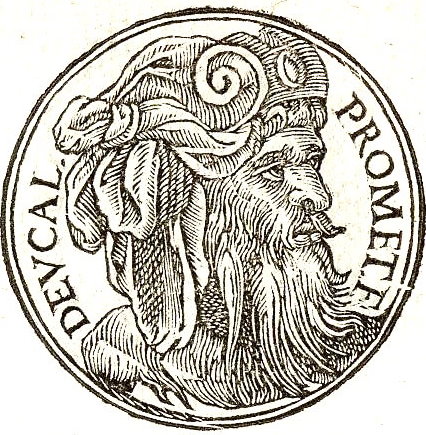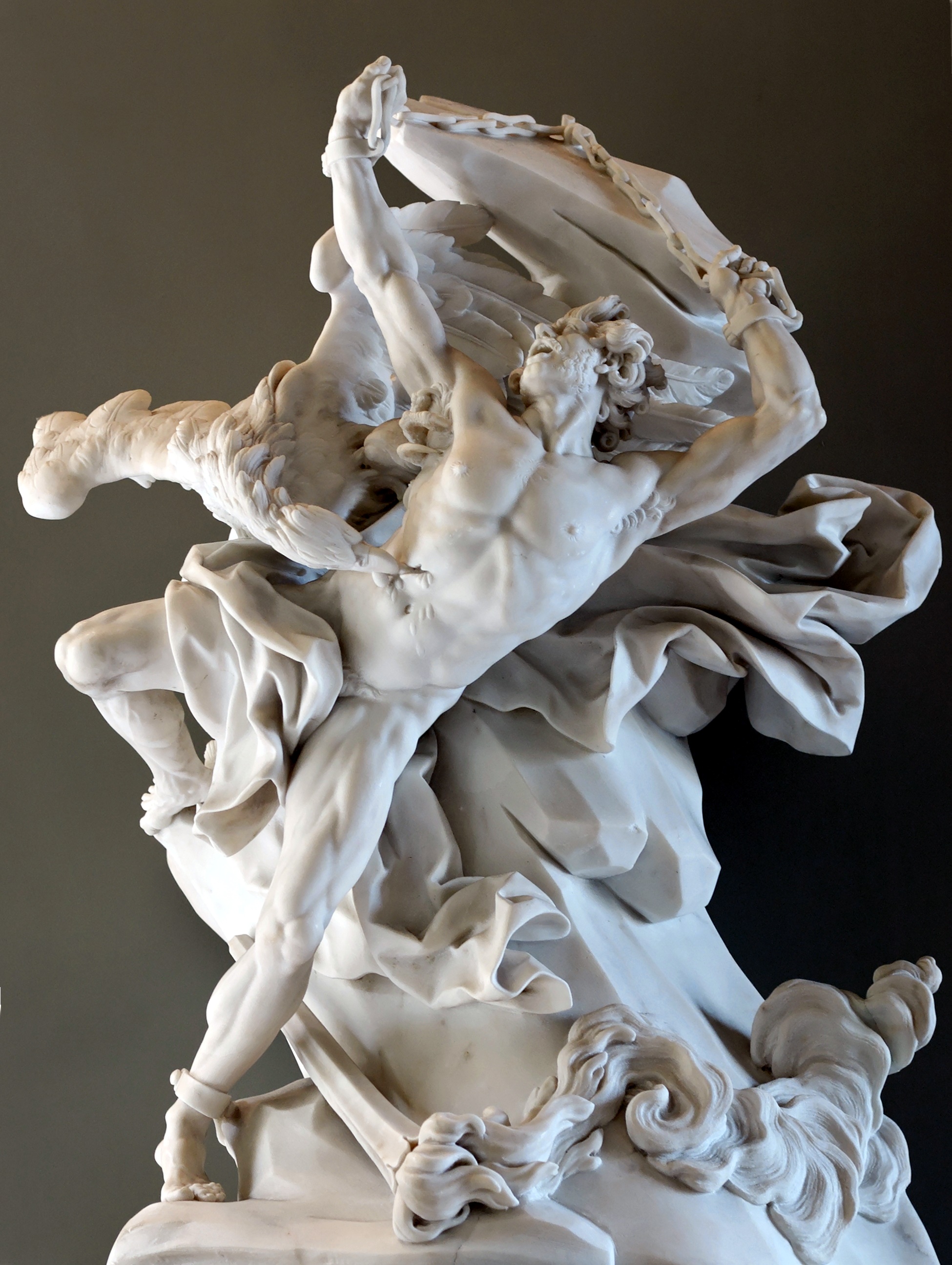|
Deucalion
In Greek mythology, Deucalion (; ) was the son of Prometheus; ancient sources name his mother as Clymene (mythology), Clymene, Hesione (Oceanid), Hesione, or Pronoia (mythology), Pronoia.A Scholia, scholium to ''Odyssey'' 10.2 (=''Catalogue of Women, Catalogue'' fr. 4) reports that Hesiod called Deucalion's mother "Pryneie" or "Prynoe", corrupt forms which Karl Wilhelm Dindorf, Dindorf believed to conceal Pronoea's name. The emendation is considered to have "undeniable merit" by A. Casanova (1979) ''La famiglia di Pandora: analisi filologica dei miti di Pandora e Prometeo nella tradizione esiodea''. Florence, p. 145. He is closely connected with a flood myth in Greek mythology. Etymology According to folk etymology, Deucalion's name comes from , ''deukos'', a variant of , ''gleucos'', i.e. "sweet new wine, must, sweetness" and from , ''haliéus'', i.e. "sailor, seaman, fisher". His wife Pyrrha's name derives from the adjective , -ά, -όν, ''pyrrhós, -á, -ón'', i.e. "flame- ... [...More Info...] [...Related Items...] OR: [Wikipedia] [Google] [Baidu] |
Δευκαλίων
In Greek mythology, Deucalion (; ) was the son of Prometheus; ancient sources name his mother as Clymene, Hesione, or Pronoia.A scholium to ''Odyssey'' 10.2 (='' Catalogue'' fr. 4) reports that Hesiod called Deucalion's mother "Pryneie" or "Prynoe", corrupt forms which Dindorf believed to conceal Pronoea's name. The emendation is considered to have "undeniable merit" by A. Casanova (1979) ''La famiglia di Pandora: analisi filologica dei miti di Pandora e Prometeo nella tradizione esiodea''. Florence, p. 145. He is closely connected with a flood myth in Greek mythology. Etymology According to folk etymology, Deucalion's name comes from , ''deukos'', a variant of , ''gleucos'', i.e. "sweet new wine, must, sweetness" and from , ''haliéus'', i.e. "sailor, seaman, fisher". His wife Pyrrha's name derives from the adjective , -ά, -όν, ''pyrrhós, -á, -ón'', i.e. "flame-colored, orange". Family Of Deucalion's birth, the ''Argonautica'' (from the 3rd century BC) stated: ... [...More Info...] [...Related Items...] OR: [Wikipedia] [Google] [Baidu] |
Pyrrha
In Greek mythology, Pyrrha (; ) was the daughter of Epimetheus and Pandora and wife of Deucalion of whom she had three sons, Hellen, Amphictyon, Orestheus; and three daughters Protogeneia, Pandora and Thyia. According to some accounts, Hellen or Helmetheus was credited to be born from Pyrrha's union with Zeus. Etymology In Latin, the word ''pyrrhus'' means red from the Greek adjective πυρρός, ''purrhos'', meaning "flame coloured", or simply "red", referring in particular to people with red hair, as Pyrrha is described by both Horace and Ovid. Mythology When Zeus decided to end the Bronze Age with the great deluge, Pyrrha and her husband, Deucalion, were the only survivors. Even though he was imprisoned, Prometheus who could see the future and had foreseen the coming of this flood, told his son, Deucalion, to build an ark and, thus, they survived. During the flood, they landed on Mount Parnassus, the only place spared by the flood. Once the deluge was over ... [...More Info...] [...Related Items...] OR: [Wikipedia] [Google] [Baidu] |
Hellen
In Greek mythology, Hellen (; ) is the eponymous progenitor of the Greeks, Hellenes. He is the son of Deucalion (or Zeus) and Pyrrha, and the father of three sons, Dorus, Xuthus, and Aeolus (son of Hellen), Aeolus, by whom he is the ancestor of the Greek peoples. Family The ''Catalogue of Women'' (sixth century BC?) is a fragmentary poem attributed to Hesiod; the work is structured around a large genealogy of mortals, Hellen's family being described in Book 1 of the poem. According to a scholia, scholion on Apollonius of Rhodes' ''Argonautica'', Hellen, in the poem, is called the son of Pyrrha, by either Deucalion, or alternatively, by Prometheus (who is called the father of Deucalion in the same passage). The latter parentage, however, it seems was not a part of the ''Catalogue'', but rather a mistake on the part of the scholion. A scholion on the ''Odyssey'' similarly calls Hellen a son of Deucalion and Pyrrha, giving his siblings as Amphictyon, Protogeneia, and Melanthea (Me ... [...More Info...] [...Related Items...] OR: [Wikipedia] [Google] [Baidu] |
Catalogue Of Women
The ''Catalogue of Women'' ()—also known as the ''Ehoiai '' (, )The Latin transliterations ''Eoeae'' and ''Ehoeae'' are also used (e.g. , ); see Catalogue of Women#Title and the ē' hoiē-formula, Title and the ''ē' hoiē''-formula, below. Though rare, ''Mulierum Catalogus'', the Latin translation of , might also be encountered (e.g. ). The work is commonly cited by the abbreviations ''Cat''., ''CW'' (occasionally ''HCW'') or ''GK'' (= ''Gynaikon Katalogos'').—is a Lost literary work, fragmentary Ancient Greek literature, Greek Epic poetry, epic poem that was attributed to Hesiod during antiquity. The "women" of the title were in fact heroines, many of whom lay with gods, bearing the heroes of Greek mythology to both divine and mortal paramours. In contrast with the focus upon narrative in the Homeric ''Iliad'' and ''Odyssey'', the ''Catalogue'' was structured around a vast system of genealogy, genealogies stemming from these unions and, in Martin Litchfield West, M. L. West' ... [...More Info...] [...Related Items...] OR: [Wikipedia] [Google] [Baidu] |
Prometheus
In Greek mythology, Prometheus (; , , possibly meaning "forethought")Smith"Prometheus". is a Titans, Titan. He is best known for defying the Olympian gods by taking theft of fire, fire from them and giving it to humanity in the form of technology, knowledge and, more generally, civilization. In some versions of the myth, Prometheus is also credited with the Creation of life from clay, creation of humanity from clay. He is known for his intelligence and for being a champion of mankind and is also generally seen as the author of the human arts and sciences. He is sometimes presented as the father of Deucalion, the hero of the flood story. The punishment of Prometheus for stealing fire from Olympus and giving it to humans is a subject of both ancient and Prometheus in popular culture, modern culture. Zeus, king of the Olympian gods, condemned Prometheus to eternal torment for his transgression. Prometheus was bound to a rock, and an eagle—the emblem of Zeus—was sent to eat hi ... [...More Info...] [...Related Items...] OR: [Wikipedia] [Google] [Baidu] |
Protogeneia
Protogeneia (; Ancient Greek: means "the firstborn"), in Greek mythology, may refer to: *Protogeneia, a Phthian princess as the daughter of King Deucalion of Thessaly and Pyrrha, mythological progenitors of the Hellenes. She was the sister of Hellen and Amphictyon, and possibly of Thyia and Pandora II, Melantho ( Melanthea) and Candybus. By Zeus, Protogeneia became the mother of Opus, Aethlius, Aetolus and possibly of Dorus. *Protogeneia, also called Cambyse, daughter of the above Opus. Zeus carried her off from the land of the Epeans and became by her, on mount Maenalus in Arcadia, the father of Opus II.Hardp. 564 Scholia on Pindar, ''Olympian'9.85 (Drachmann, pp. 288–289) ''BNJ'' 4 F117a She was later received by Locrus who for being childless, married Protogeneia and adopted her son Opus as his own. *Protogeneia, a Calydonian princess as the daughter of King Calydon and Aeolia, daughter of Amythaon, and thus sister to Epicaste. By Ares, Protogeneia becam ... [...More Info...] [...Related Items...] OR: [Wikipedia] [Google] [Baidu] |
Amphictyon
Amphictyon or Amphiktyon (; ), in Greek mythology, was a king of Thermopylae and later Athens. In one account, he was the ruler of Locris.Pseudo-Scymnus, Pseudo-Scymnos, ''Circuit de la terre'587 ff./ref> Etymology The name of Amphictyon is a back-formation from ''Amphictyons'', plural, from Latin ''Amphictyones'', from Greek ''Amphiktyones, Amphiktiones'', literally, "neighbors" or "those dwelling around" from ''amphi- + -ktyones, -ktiones'' (from ''ktizein'' to found); akin to Sanskrit ''kṣeti'' he dwells, ''kṣiti'' abode, Avestan ''shitish'' dwelling, Armenian ''šen'' inhabited, cultivated. Family Amphictyon was the second son of Deucalion and Pyrrha, although there was also a tradition that he was Autochthon (ancient Greece), autochthonous (born from the earth);Apollodorus, 3.14.6 he was also said to be a son of Hellen, his brother in the first account. Amphictyon's other (possible) siblings besides Hellen were Protogeneia, Thyia of Thessaly, Thyia, Pandora of Thessa ... [...More Info...] [...Related Items...] OR: [Wikipedia] [Google] [Baidu] |
Flood Myth
A flood myth or a deluge myth is a myth in which a great flood, usually sent by a deity or deities, destroys civilization, often in an act of divine retribution. Parallels are often drawn between the flood waters of these Mythology, myths and the primeval Abzu, cosmic ocean which appear in certain creation myths, as the flood waters are described as a measure for the social cleansing, cleansing of humanity, for example in preparation for wikt:rebirth, rebirth. Most flood myths also contain a culture hero, who "represents the human craving for life". The oldest known narrative of a List of flood myths, divinely inititated flood originates from the Sumer, Sumerian culture in Mesopotamia, among others expressed in the Akkadian Atra-Hasis, Athra-Hasis epic, which dates to the 18th century BCE. Comparable flood narratives appear in many other cultures, including the biblical Genesis flood narrative, ''manvantara-sandhya'' in Hinduism, Deucalion and Pyrrha in Greek mythology, also ... [...More Info...] [...Related Items...] OR: [Wikipedia] [Google] [Baidu] |
Clymene (mythology)
In Greek mythology, the name Clymene or Klymene (; ''Kluménē'' means 'fame') may refer to: * Clymene, the wife of the Titan Iapetus, was one of the 3,000 Oceanids, the daughters of the Titans Oceanus and his sister-spouse Tethys. She was the mother of Atlas, Epimetheus, Prometheus, and Menoetius; other authors relate the same of her sister Asia. A less common genealogy makes Clymene the mother of Deucalion by Prometheus. She may also be the Clymene referred to as the mother of Mnemosyne by Zeus.Hyginus, ''Fabulae'Preface/ref> In some myths, Clymene was one of the nymphs in the train of Cyrene. * Clymene, another Oceanid, was given as the wife to King Merops of Aethiopia and was, by Helios, the mother of Phaethon and the Heliades. Others include: * Clymene, the name of one or two Nereid(s), 50 sea-nymph daughters of the ' Old Man of the Sea' Nereus and the Oceanid Doris. Clymene and her other sisters appeared to Thetis when she cries out in sympathy for the grief ... [...More Info...] [...Related Items...] OR: [Wikipedia] [Google] [Baidu] |
Hesione (Oceanid)
According to the 6th century BC mythographer Acusilaus, Hesione (; Ancient Greek: Ἡσιονη) was the daughter of Oceanus, the wife of Prometheus and the mother of Deucalion. That she was a daughter of Oceanus and wife of Prometheus, was also repeated in Aeschylus' ''Prometheus Bound''.Aeschylus, ''Prometheus Bound'552–560 Notes References * Aeschylus (?), ''Prometheus Bound'' in ''Aeschylus, with an English translation by Herbert Weir Smyth, Ph. D. in two volumes.'' Vol 2. Cambridge, MA. Harvard University Press Harvard University Press (HUP) is an academic publishing house established on January 13, 1913, as a division of Harvard University. It is a member of the Association of University Presses. Its director since 2017 is George Andreou. The pres .... 1926Online version at the Perseus Digital Library * Fowler, R. L. (2000), ''Early Greek Mythography: Volume 1: Text and Introduction'', Oxford University Press, 2000. . * Fowler, R. L. (2013), ''Early Greek Myt ... [...More Info...] [...Related Items...] OR: [Wikipedia] [Google] [Baidu] |
Greek Mythology
Greek mythology is the body of myths originally told by the Ancient Greece, ancient Greeks, and a genre of ancient Greek folklore, today absorbed alongside Roman mythology into the broader designation of classical mythology. These stories concern the ancient Greek religion's view of the Cosmogony, origin and Cosmology#Metaphysical cosmology, nature of the world; the lives and activities of List of Greek deities, deities, Greek hero cult, heroes, and List of Greek mythological creatures, mythological creatures; and the origins and significance of the ancient Greeks' cult (religious practice), cult and ritual practices. Modern scholars study the myths to shed light on the religious and political institutions of ancient Greece, and to better understand the nature of mythmaking itself. The Greek myths were initially propagated in an oral tradition, oral-poetic tradition most likely by Minoan civilization, Minoan and Mycenaean Greece, Mycenaean singers starting in the 18th century&n ... [...More Info...] [...Related Items...] OR: [Wikipedia] [Google] [Baidu] |





